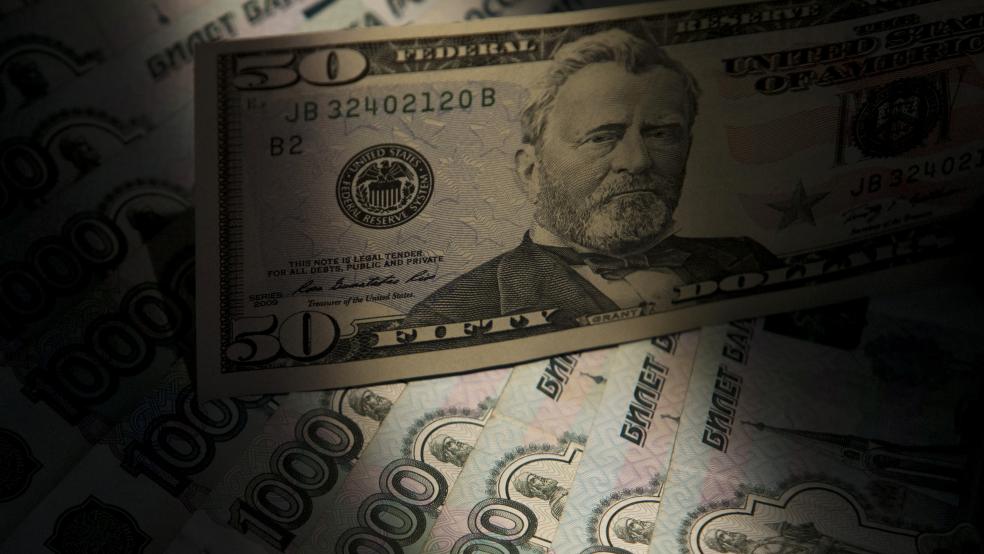He may not take shirtless horseback rides across the steppes, or have a black belt in judo, but on Thursday, President Obama sent a message to Russian president Vladimir Putin about strength. Specifically, economic strength.
The message was this: Whenever I decide to, I can pick up a pen, and kill a significant financial institution in your country.
Related: Does Putin Want to Carve Up Ukraine and Take the Spoils?
Obama’s victim was the St. Petersburg-based Bank Rossiya.
In response to Russia’s takeover of Ukraine’s Crimean peninsula, Obama yesterday authorized the Treasury Department to add 20 members of Putin’s inner circle, as well as Bank Rossiya, to the Office of Foreign Asset Control’s list of “specially designated nationals.”
The designation makes the individuals named ineligible to do business with U.S. financial institutions, which is likely a major personal inconvenience. But for Bank Rossiya, the designation is something like the kiss of death.
Bank Rossiya is not the largest bank in Russia by a long shot, but its significance lies in its clientele rather than its size. In announcing the sanctions, the Treasury Department noted that Bank Rossiya “is the personal bank for senior officials of the Russian Federation” including members of the Ozero Dacha Cooperative, an exclusive community where members of Putin’s inner circle live. In addition, it provides financial services to the single largest segment of the Russian economy – the oil, gas, and energy sector.
Essentially, this is a credit union for oligarchs, with a side business in financing the Russian energy industry. Its customers include many more high-profile Russians than just those named in the Treasury statement. As of Thursday it is, for all intents and purposes, out of business.
Related: How Vladimir Putin Is remaking a New World Order
If account holders want to do any kind of business at all short of paying their utility bills and using Russian ATMs, they are going to need to go elsewhere, said experts.
“They’ve got to go to another bank,” said Lester M. Joseph, former principal deputy chief of the Department of Justice’s Asset Forfeiture and Money Laundering section. “That bank is pretty much a pariah.”
Currently the international investigations manager at Wells Fargo Bank, Joseph said when heard about the sanctions on Bank Rossiya, the first thing he did was check to see if it was a customer of his institution. “It is not, thankfully,” he said.
The impact doesn’t stop there, Joseph explained. His next step, which is ongoing, is to see if any banks that Wells Fargo has relationships with are also doing business with Bank Rossiya, and to make sure that none of those banks are routing transactions from the Russian bank through Wells Fargo’s system. “If a transaction from that bank is coming from another bank, we would have to block it,” he said.
Related: IMF Now Divides Congress Over Support of Ukraine
Joseph said that every other bank in the U.S. is – or ought to be – doing exactly the same thing.
Considering the volume of international wire transfers that flow through the systems of U.S. banks, he said, this essentially shuts down Bank Rossiya’s access to a huge portion of the worldwide banking system.
As one U.S. official told Reuters, Bank Rossiya will be “frozen out of the dollar.”
And it only gets worse.
Even if governments in other countries don’t join the U.S. in sanctions against Bank Rossiya, their bankers will have a very strong incentive to stop doing business with the Russian bank if they have any ties at all to U.S. institutions – which virtually all significant international banks do.
Related: Russia’s Provocative New Act of Aggression in Ukraine
“If they are doing business with that bank, and they are also doing business in the United States, if something slips through,” then suddenly they’re facing U.S. regulatory action, said Robert Rowe, vice president and senior counsel for the American Bankers Association. International wire traffic is voluminous and largely automated, he said, making it easier for an international bank to simply stop doing business with Bank Rossiya rather than trying to route transactions associated with it away from the U.S.
Rowe said this would affect not only individuals who do their banking at Bank Rossiya, but perhaps more importantly, the oil and gas companies that arrange their trade financing through the bank.
“That’s where it’s going to have an impact,” said Rowe.
Banking experts said that one of the uncertainties surrounding yesterday’s move is how Russia will respond. The Russian government immediately released a widely mocked list of U.S. officials whom it said would be blocked from doing business in Russia.
Related: Confusion Reigns Over Path Forward in Crimea
Politicians named on the list rushed to Twitter to boast about being sanctioned and to leave sarcastic comments about being forced to forgo vacations in Siberia.
However, according to John Byrne, executive vice president of the Association of Certified Anti-Money Laundering Specialists – a trade group for bankers and law enforcement professionals who deal with issues including OFAC compliance – that’s likely not the end of it.
“There’s no question these sanctions are an appropriate and effective national security tool,
he said, “but this is a country that can fight back.”
How Russia reacts to the sanctions, Byrne said, will be closely watched by the financial community. And that reaction is by no means predictable. In general, major industrialized countries don’t try to shut down each other’s financial institutions without evidence of blatant illegal activity – which does not appear to exist in the case of Bank Rossiya.
“This is a new thing,” said Joseph. “It’s not a rogue bank. It’s a bank in a country where we do a lot of business. It’s not involved in a criminal case.” Compared to other actions by past administrations, he said, “It’s much more complex.”
Top Reads from The Fiscal Times





